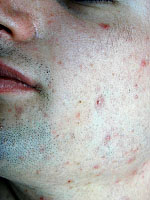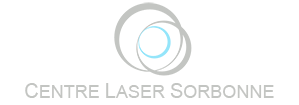Acne laser treatment
Dernière mise à jour le 06/06/2022 par Antonin Catrin
Acne is a skin condition connected with sebum retention, causing comedones or microcysts. Bacteria play an important role, causing a secondary infection of the comedones or cysts. Acne affects approximately one-third of teenagers to varying degrees, and a growing number of acne outbreaks may be observed among adults.
Acne occurs in different forms, and its causes are not all known. For example, acne of the back is often linked to hyperseborrhea. Rapidly becoming extremely inflammatory, it leaves permanent unsightly scars. Facial acne, the most widespread form, often disappears spontaneously.
Acne Treatment / What to Expect from a Laser Treatment

Topical treatments
A great number of creams, gels and pomades are available for acne treatment, most of them by prescription. They are intended to halt bacteria growth with antiseptics (benzoyle peroxide) or antibiotics, or to reduce sebum secretion (retinoids).
These medications are rather effective but – despite the fact that they are used locally – they are not devoid of risks, notably photosensitivity. Sun exposure must therefore be avoided during the entire treatment process. To be fully effective they must be used for several months, so treatment must be continued even if the condition is apparently healed.
Oral treatments
Such treatments, used for severe acne, are effective when intelligently prescribed. There are three categories : antibiotics, retinoids and hormone therapy.
- Antibiotics limit the growth of the bacteria (Propionibacterium acnes) that infect the pilosebaceous follicles.
- Retinoids are represented mainly by isoretinoin. This molecule is very active but may cause birth defects. An effective contraceptive must therefore be taken before, during and after treatment. It also causes unpleasant side effects : chapped lips, itching, nosebleeds and photosensitivity.
- Hormone therapies are based on the combination of two types of hormones : an estrogen and a progestogen. The latter combats androgens, “male” hormones that favor acne development.
All these treatments of inflammatory acne, often very bothersome, are intended to modify the area of the sebaceous glands, allowing for a reduction in sebum production and thus of the acne.
Laser treatment of acne scars
Acne scars can be treated only when the condition has stopped developing. The specialist has different techniques at his disposal : cryotherapy, exfoliation, dermabrasion… Your dermatologist will advise you regarding your particular case.
The Centre Laser Sorbonne uses 2 different Fractional Lasers.
* The 1540 non-ablative laser module of the ICON platform from Cynosure.
* The CO2 Fractional Laser EXELO2 from Quantel Derma.
What is the role of laser technology in the treatment of inflammatory acne ?
Inflammatory acne treatment is a new field for lasers. Published clinical studies have demonstrated the effectiveness of certain lasers in treating outbreaks of inflammatory acne. The principle is to temporarily alter the sebaceous glands that cause the outbreaks and to reduce bacteria growth. In fact, the object is to achieve the same effects as those of oral treatments but without the constraints or side effects.
How are acne outbreaks treated with the Aramis laser ?
At the Centre Laser Sorbonne we have selected the Erbium:Glass laser (the Aramis laser from Quantel Medical) used with different parameters than those used for remodelling.
This laser’s wavelength is long enough (1540 nm) to target the sebaceous glands in the dermis. A very important point : the laser has a powerful and dependable cooling system to protect the epidermis. Thus, the laser beam goes through the dermis without damaging the upper layers of the skin. It may therefore be used without an anesthetic cream. Aside from treating inflammatory acne lesions, the laser offers the additional benefits of shrinking the pores of the skin and reducing certain residual acne scars by stimulating the production of collagen and elastin.
The Centre Laser Sorbonne uses the 1540 module of the ICON laser for acne scar reduction.
Laser Acne Treatment Precautions
As in all other acne treatments, sun exposure results in a temporary improvement followed by an aggravation (secondary hyperkeratosis).
It thickens the skin, beneath which retained substances accumulate in summer, causing an outbreak in autumn.
A sunscreen must therefore be applied to the face in summer.
A Typical Acne Laser Treatment
All lesions are treated at each session. An average of fifteen minutes is necessary for a “classic” case of facial acne.
Treatment often requires several sessions (three or four) spaced two to four weeks apart.
Protective eyewear is necessary for the patient as well as the doctor.
The doctor exposes each lesion to the laser beam, selecting parameters that cause a pricking sensation that the patient can easily tolerate. The main parameter involves (fluence A hydrating cream is applied at the end of the session.
Laser Acne Treatment : Potential Counter-Indications
Aside from pregnancy, which always constitutes a counter-indication as a matter of principle, the main counter-indication for treating acne by laser is the taking of retinoid-type medications.
After Your Acne Laser Session …
Aside from a temporary hot sensation, some patients experience a slight erythema and sometimes an edema around them. It is also possible to experience an itching of the acne lesions, which obviously must not be irritated.
Acne Laser Treatment Price
Your first appointment will be a medical consultation and will be invoiced 45 € TTC.
Depending on the length of the session and the size of the area treated, each session for treating inflammatory acne varies from 90 to 180 €.
For acne scars the session varies from 160 to 380 €. You will receive a detailed estimate at your first medical consultation at the Centre.
